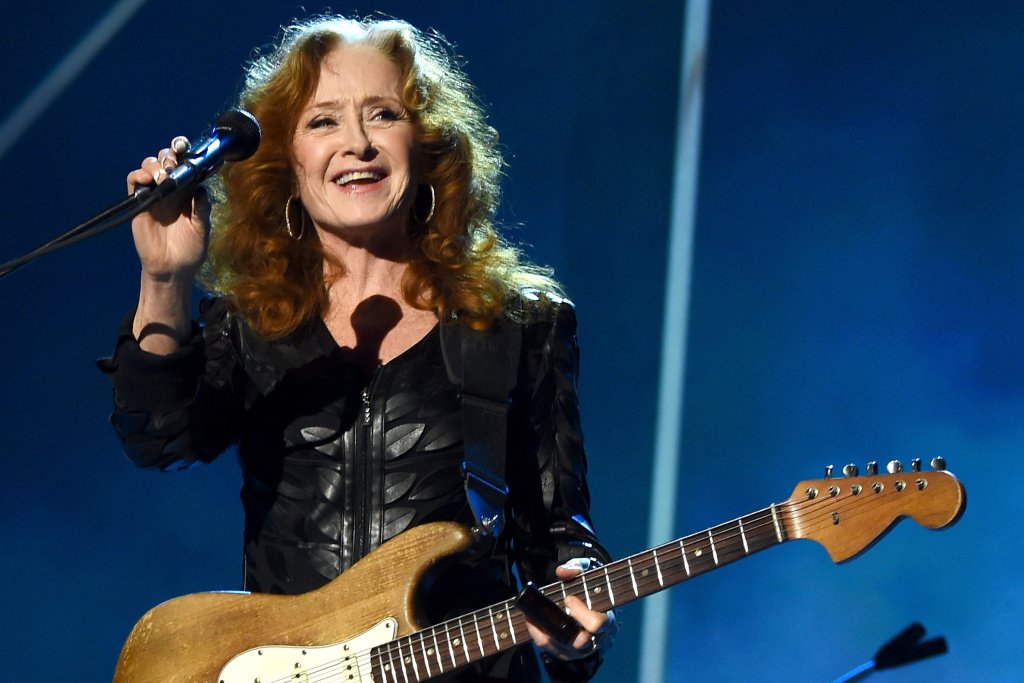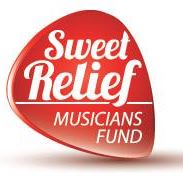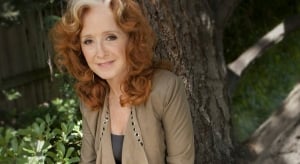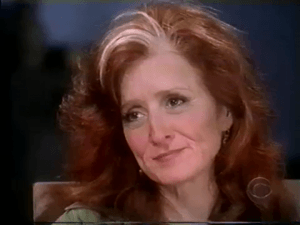

Bonnie Raitt wanted a career in social justice — then she fell in love with music
by Michelle Lanz and Elizabeth Nonemaker | The Frame
Even at the start of her career, Bonnie Raitt says she was “aiming for the long run.” It turns out her aim was pretty good: Raitt’s music spans five decades so far and, with the release of a new album, shows no sign of slowing down.
“Dig in Deep,” released earlier this year, is Raitt’s 17th studio album. Later this month, Raitt and her band embark on a tour that will last for most of 2016.
It could be a grueling schedule for some, but Raitt says performing is “energetically… as close to a whirling dervish as you can get,” and that the “two hours on stage make all the other 22 hours” worth it.
When she met with The Frame’s John Horn, Raitt also spoke of the desire to “share the wisdom” she’s absorbed, saying “the gift of this age is that you have a perspective you didn’t have before.”
The songs on “Dig in Deep” explore relationships differently than previous songs. “Unintended Consequence of Love,” for example, acknowledges an ailing relationship, but asks how to fix it rather than bring it to an end.

John Horn began his conversation with Bonnie Raitt by asking her to reflect on her last tour, for the 2012 album “Slipstream.”
tip: most convenient way to listen while browsing along is to use the popup button of the player.
INTERVIEW HIGHLIGHTS
I’ve loved the road since I started. But this last time was especially sweet because I was coming out of a very fertile decade, musically. I did a couple albums and two long tours. But during which, my parents both got ill, sequentially passed away a year from each other. My brother was fighting brain cancer from 2000 to 2009 when he passed away. So it was a tough time to be working and dealing with all of that loss, and not crumble. So I took a year off to do some grief counseling. I knew that I would wait to come back to music until I was really missing it. At the end of it, Joe Henry and I did some exploratory sessions. And it was so much fun to do music again, it really jump-started me.
I called the band, booked a studio, produced the rest of the record with my touring guys. The tour was fun because I was no longer dealing with illness and loss.
Do songs from your catalogue take on new meaning as time goes on?
Yeah. I mean, every breakup, there’s a different person to think about when you’re singing about how mad you are! Or how sorry you are. There’s a gamut of emotions of things you sing about.
Like “Spit of Love” and “Love Has No Pride” — [are] about relationships I was in. But it’s interesting now, not being in a crummy situation. I can look back and it reminds me, don’t go there again!
“Slipstream” was one of the better-selling independent releases of 2012. It was on your own label, Redwing Records. Can you talk about Redwing and what that success meant to you?
Well, it was especially sweet to have those kinds of sales in an era where CD sales are really plummeting. Thank God I can tour and make a living, because if I had to live on CD sales, we’d all be getting a day job.
Even for someone like you?
It’s the touring. I’m not lying, I’ve saved money for years so I could start my own label. [It can work] only if you have a team of people that are really savvy and willing to work that hard, and you have a nest egg where you can fund your own project. But the cost of CD manufacturing and the ability to get the music out digitally, make a deal with a distribution company — it all was something I oversaw anyway when I was with a label. So if you’re going to make less money from each CD, why not just cut out the middle man and do it yourself?
That said, I don’t do that day-to-day heavy lifting that my staff does.
I want to compare two songs you’ve performed about the difficulty of staying in love. The first is “Have a Heart” from your 1989 album, “Nick of Time.” The other is your new song, “Unintended Consequence of Love.” The first is basically, I’m in this bad relationship and how do I get out? The second is, I’m in a bad relationship, how do we fix it?
Yeah.
Is that part of your evolution as an artist, the different frame of mind you’re in? With age comes a little wisdom? How do you explain the differences between these two songs?
We all have been in relationships that get a little stale. You look across the table and think, What was it about you I liked again? And sometimes you’re just butting heads all the time. And that could be a coworker, you know?
With 29 years of sobriety, when something’s not working in a relationship, it really bugs me. It’s not healthy for me to not say something. I’ve had enough therapy and awareness of why you’ve got to sit down with the person and say, We’ve gotta work this out. In a love relationship, why throw away the baby with the bathwater? People too easily toss it and find somebody new. It’s too hard to find somebody! As someone once said, It takes a funny-lookin’ shoe to fit a funny-lookin’ foot. If you’ve got something worth it, at least investigate to see if you can get back.
But it does seem that people have a stronger connection to a breakup song than they might have to a falling-in-love song. Is that true with you?
Absolutely. “I Can’t Make You Love Me” is the one that people mention the most.
Well, it’s gotta get me bad. Like, “Uptown Funk” does that to me. “Start Me Up.” Any Aretha Franklin song. I’m such a music fan. There’s no question when I hear the ones I’ve covered, whether it was Del Shannon’s “Runaway” or “Burning Down the House.” There are songs that burn a hole in me, that I love so much I’ve gotta do them live.
And I knew that this particular tune I would cut one day. It’s one of the sexiest things I’ve ever heard. To play slide [guitar] over that, sing “You’re one of my kind,” and then sneak in with the slide — it’s as insinuating, as Mae West used to say, as you can get.
You’re 66, but you still have amazing amounts of energy. What is it you find so exciting and thrilling about being on stage, and has it changed over the course of your career?
Well, the adrenaline and emotional release, but then what you get back — the receiving part of it from the audience — it’s a back-and-forth thing. They give more as I give more. Energetically, it’s as close to a whirling dervish as you can get. It’s something that I watched my dad have. I’ve seen many shows of people that I love, Bob Dylan to the Stones, to Toots and the Maytals — those ecstatic moments for the audience and the band never have stopped. I’m such a fan and I can’t believe I get to do this. Those two hours on stage make all the other 22 hours, changing cities five times a week — there are ups and downs to this lifestyle. You have to be built for it and like it. It keeps me vital and young and I love it still.
Do you remember what it was like to be a child in the audience watching your father do musical theater?
Absolutely. I sat in the wings of “Pajama Game” on Broadway when I was like five or six years old. Hung out in the dressing room, copped all his little mints out of the bowl. I knew how much he loved it. It’s just in my blood, I think, as is the road life.
Did you recognize it then, that the idea of being onstage and having the audience with you was something you had to be a part of?
No, I had no interest in doing this for a living. I was in college and I just played music for fun. I needed to make a little side money when I took a semester off to hang out with these blues guys. I just happened to get gigs opening for them through connections I had. That was the greatest thing that ever happened to me because I ended up raising more money for my causes, being able to do more with my life, have more control over my business. It was an incredible gift.
I want to talk about a friend and I suspect a mentor who meant a lot to you who we lost in the last year. What did B.B. King mean to you, personally and musically?
He was so encouraging to me. I know he was delighted to find out I could play like I did. That’s probably what got my foot in the door years ago, that set me apart from other women. Maybe they had a bigger fan base but I was aiming for the long run, to just play really good shows like my dad did — every show [as] opening night. And B.B. had the same philosophy. He liked to take care of his band the way I like to take care of my band and crew. He was humble and gracious and never had a bad word to say to anybody. Same guy offstage as he was onstage, and a monster talent. And his guitar playing and phrasing as a singer and a guitarist influenced me tremendously. But his friendship was just delightful. He always spoke so highly of me and he knew I loved him, too.
Watch: Bonnie Raitt perform a tribute to B.B. King at the 2016 Grammys with Chris Stapleton and Gary Clark, Jr.
As long as you’ve played music, you’ve cared about the ways you can help change the world. How important is that part of your career, and why is it such a priority to you, and what are the causes that you’re really passionate about now?
My folks were Quakers. We were very much involved in helping people that were getting a raw deal — war zones, conflicts of some kind, hunger. The whole dream of world peace was something I grew up with, and justice as well. So the civil rights movement and the “Ban the Bomb” movement were the first early participation I had. I believed in trying to get people to sit down at the table.
So that was a big push, and the ’60s of course had all the social justice and the feminist movement and the back-to-the-country and cleaner food and saving the environment — all of those issues became really important to me as well as getting out of Vietnam. I was part of the generation that was very motivated about that.
I was planning a career in social organizing. Here I was, I fell into the music business. But I’ve been doing benefits in order to raise consciousness and funds all along. It’s just really important to me to give back and not take this opportunity that I have to lend some support.
At this point in your life, both musically and as a person, what does the title “Dig In Deep” mean to you?
I wanted to call the record this because I thought the grooves really, musically, were digging in as deep as you can. I mean with passion and emotion and focus. At this point in our lives, this band and I have a connection that is really deep. And then those ballads for me, to dig deep into your emotional psyche — the gift of [being 66] is that you have a perspective you didn’t have before. I want to keep digging deeper because I’ve covered some pretty heavy songs from my earliest records. And when you have something that you want to say that shares the wisdom that you’ve gotten, or the questions that you have, then that’s digging deep.
Bonnie Raitt will tour throughout 2016. She comes to Southern California in late July.
Source: © Copyright Southern California Public Radio – The Frame











 Visitors Today : 135
Visitors Today : 135 Now Online : 2
Now Online : 2















































































































